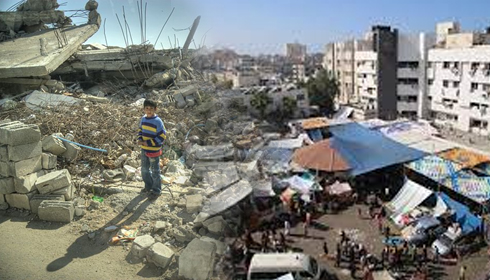
Gaza conflicts turn Al-Shifa Hospital into a minimally operational one
Al-Shifa Hospital, previously Gaza's most essential and largest referral institution, is now on the verge of collapse due to the region's recurrent battles, which have left it barely operating. On December 16, a joint trip coordinated by WHO experts in partnership with the United Nations showed the hospital's terrible status.
The hospital, which currently houses only a few doctors, nurses, and 70 volunteers, operates under unimaginably difficult conditions, as described by WHO personnel who labelled it a "hospital in need of resuscitation."
Because of a significant lack of fuel, oxygen, specialised medical staff, and crucial supplies, critical operating theatres and other major services remain inoperable. The hospital can only give basic trauma stabilisation and does not even have enough blood for transfusions.
Currently, the hospital can administer dialysis to approximately 30 patients each day, with equipment running on a tiny generator 24 hours a day, seven days a week.
A WHO official who was part of the UN team that brought the latest aid to the hospital compared the emergency room to a "bloodbath," with hundreds of injured patients inside and new ones arriving every minute.
The pressure is so paramount that healthcare officials are forced to treat trauma victims on the floor, with little to no access to pain management.
A source at the hospital said that because of the overcrowding at Al-Shifa, critical cases are being transported to Al-Ahli Arab Hospital for surgery.
It may be recalled that tens of thousands of displaced people are taking safety within the hospital's grounds, exacerbating the issue. They require immediate humanitarian assistance to supply them with food, water, and shelter.
Many displaced people begged the mission team that reached the hospital with humanitarian supplies to inform the world about the gravity of their plight, hoping for a quick end to their misery.
Al-Shifa Hospital is facing a serious food and water crisis for its staff, patients, and displaced citizens. This catastrophic situation highlights the mounting concerns over the Gaza Strip's prolonged hunger, which has ramifications for people's health and vulnerability to infectious diseases.
In a statement, the UN Health Agency said that in the following weeks, it plans to strengthen Al-Shifa Hospital to restore at least basic functionality.
With regular supplies of fuel, oxygen, medicines, food, and water, up to 20 operating theatres and post-operative care facilities can be activated, the statement added.
Additional specialised medical, nursing, and support personnel, especially emergency medical teams, are desperately needed.
Meanwhile, according to Hamas sources, the current retaliatory offensive by Israel and Gaza has killed 18,800 people, mostly women and children. However, the numbers could not be verified by independent sources.
It may be recalled that the United Nations Security Council has failed to pass a resolution calling for the cessation of fighting, despite overwhelming member countries pressing for one.
In a statement rereleased recently by the UN Secretary-General, “I urged the Security Council to press to avert a humanitarian catastrophe, and I reiterated my appeal for a humanitarian ceasefire to be declared," said UN Chief António Guterres.
"Regrettably, the Security Council failed to do it, but that does not make it less necessary. So, I can promise I will not give up," he told participants while addressing them at the global platform in Qatar, which brought together world leaders to discuss collective security and other issues.
He said a sclerotic Security Council where splits between the permanent members—China, France, Russia, the United Kingdom, and the US—have produced only one resolution narrowly focused on aid delivery and needed reform.